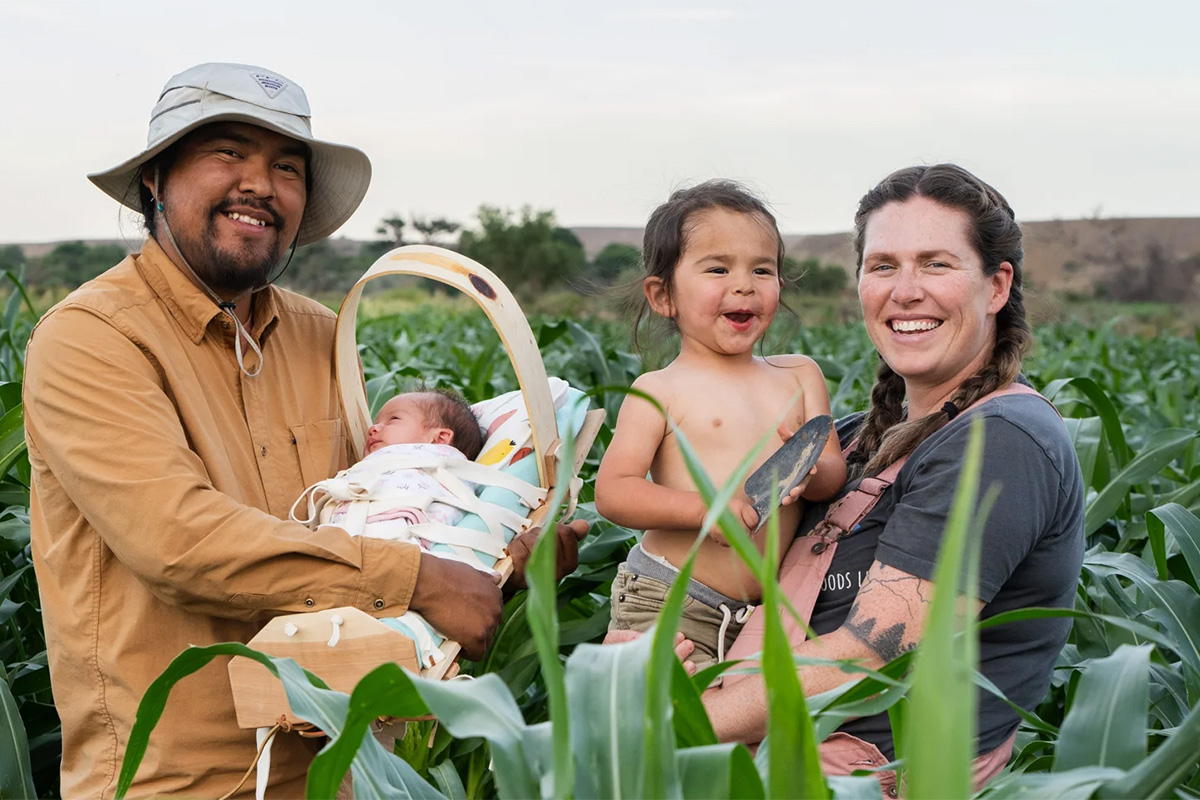The red earth tells stories here. So does the corn.
Amid the sweeping vistas of the Navajo Nation, where ancestral rhythms of agriculture hum beneath the blaze of contemporary life, a quiet revolution is taking shape. In the shadow of Shiprock, New Mexico, Bidii Baby Foods emerges not merely as a business enterprise but as a reclamation of Indigenous food sovereignty, a profound reimagining of economic development that transcends conventional market attitudes.
Founded by Zachariah and Mary Ben in 2021, Bidii Baby Foods represents a powerful intersection of traditional knowledge and contemporary necessity—a response to the profound disconnect between families and their ancestral foods in one of America’s most recognized food deserts. The enterprise’s name carries cultural significance beyond its commercial identity; in Navajo, “bidii” refers to someone with a hearty appetite or rounded stomach—traditionally a sign of prosperity and well-being.
“Bid in Navajo is your stomach. So when you’re Bidii, you have a little bit of a bigger stomach,” explains Zachariah. “Back then, way back then, when somebody would be a good farmer, somebody is a good hunter, they were Bidii… They had nice well-rounded stomachs because they were able to take care of themselves, take care of their families, and provide for themselves in that way.”
Seeds of Change: Origins in Necessity
The genesis of Bidii Baby Foods illuminates how parenthood can catalyze profound innovation within structural constraints. “The origin story of Bidii Baby Foods started with birth,” Zachariah reflects. “When we first found out we were pregnant with our son, our first born, who is three years old now, it really brought a lot of things into place.”
This pivotal moment coincided with the COVID-19 pandemic, a time when food supply vulnerabilities became acutely visible across America but were dramatically magnified in remote tribal communities. With approximately 30% of families on the Navajo Nation lacking electricity for food storage and the average one-way journey to access fresh foods exceeding 50 miles, the Bens confronted a stark reality: their child would face the same nutritional challenges that had shaped generation after generation on the reservation.
“As farmers, as providers, as caregivers, as educators,” Zachariah recalls, “we decided to dedicate that first season of farming to our son.” This commitment yielded more than crops: it produced a vision for reconnecting Indigenous children with their nutritional heritage, beginning with their son Yabiitoh, whose name translates to “water from the sky that the ground is softened with.”
The company’s philosophical foundation intertwines ecological stewardship with child development—a holistic perspective captured in their mission statement: “Our mission at Bidii Baby Foods is to reconnect indigenous families with our long-standing relationship between earth and parenting. We believe that there is a direct connection between nurturing the land and nurturing our children.”
Cultivating Against Constraints: The Business Model Innovation
The Bens’ entrepreneurial journey reveals how Indigenous business development must navigate uniquely challenging terrain. Operating on tribal trust land—a designation that carries significant structural limitations—Bidii Baby Foods confronts constraints unknown to conventional enterprises.
“Tribal land where we’re specifically residing at and operating at is what we would call an agricultural land use permit,” Zachariah explains. “We lease this land from the Navajo Nation and the Navajo Nation is given this land by the federal government through a federal trust. And these were all enacted by treaties that were founded in 1864.”
This historical context creates contemporary barriers to capital formation. “With these treaties, it also hinders us… building entrepreneurship and developing in those areas,” notes Zachariah. The implications are profound: “We cannot build a manufacturing facility here on an agricultural land use permit where we do a majority of our crop production… we cannot also take this 40 plus acres that we have to the bank. If we were to take it to the bank, the bank would not recognize this as equity to help us leverage funding.”
This institutionalized inequity necessitated an innovative business structure. Mary Ben illuminates their strategic response: “When we first started with Bidii Baby Foods, being a farm on tribal trust land, we did not have the same access to capital that other farms would have if they were farming on private land… We needed to get really creative in the different ways we were able to access capital to start up.”
Their solution represents a significant innovation in Indigenous entrepreneurship: a hybrid model integrating a for-profit enterprise (Bidii Baby Foods LLC) with a nonprofit organization (The BEN Initiative). This structural adaptation creates pathways to capital access where conventional financial systems fail.
“Part of that solution for us really was to develop sort of like a hybrid for-profit, nonprofit, two different organizations that work in tandem, not only to uplift Bidii Baby Foods, but also to uplift other independent indigenous farmers in our area,” Mary explains. The BEN Initiative—established in 2022—has grown rapidly to become a critical infrastructure component, fiscally sponsoring approximately one million dollars in agricultural development projects across the community.
Regenerative Economics in Practice
Bidii Baby Foods exemplifies what might be termed “regenerative capitalism,” an economic model that generates value while simultaneously healing ecological and social systems. Their core products—dehydrated baby cereals crafted from heritage crops like Navajo white corn, amaranth, and squash—represent an elegant solution to preservation challenges in homes without reliable refrigeration.
The enterprise has undergone a striking evolution in its market orientation. “One of our huge successes in our beginning years, a lot of our direct to consumer sales were online and cash itinerant sales like person to person sales at the flea market, farmers markets,” recounts Zachariah. “And so that’s where a majority of our sales went. About 90% of our sales were in the DTC area, direct to consumer. And about 10% was to invoicing to institutions, healthcare facilities.”
A pivotal opportunity emerged through the New Mexico Grown Program, enabling Bidii Baby Foods to become a certified supplier for institutional markets. This certification catalyzed a dramatic shift in their business model:””Now currently 80% of our sales go to institutions, 15% of that is to online, and then 5% of that is direct to consumer.”
This institutional focus represents a strategic refinement with profound implications for sustainable development. “Institutional sales are very quite important, especially sustaining a small rural tribal farm,” Zachariah observes. “Through these institutional sales, it allows us to create that security that we can then create investments into other farmers within our area.”
Beyond Scale: The Lateral Growth Model
Perhaps most revolutionary in Bidii Baby Foods’ approach is their explicit rejection of conventional growth metrics in favor of what they term “lateral growth.” Mary articulates this vision: “We want to grow laterally rather than horizontally. And so that lateral growth for us looks like working with young farmers, helping them access tribal trust land, helping them access capital, these big structural barriers that often prevent most young farmers from getting on their feet starting a business.”
This approach manifests concretely in their Farmer-in-Residence program, which provides comprehensive agricultural training, entrepreneurship education, and resource sharing for young Indigenous farmers under 30 years old. The program offers two distinct pathways: one for those focusing exclusively on cultivation techniques to supply Bidii Baby Foods, and another for entrepreneurs interested in developing their own product lines and businesses.
“We were able to continue on to the production side of things… We have to travel off reservation to a border town that has that infrastructure to accompany our manufacturing process,” Zachariah explains, highlighting the logistical challenges that have shaped their expansive vision for community infrastructure.
“Bigger long-term goals… is to be able to build from the ground up in Shiprock a centralized aggregation facility,” Mary elaborates. This five to six million dollar project would create a processing hub where local farmers could bring their crops, access value-added processing capabilities, and develop their own market-ready products. Essentially, the Bens want to build the missing infrastructure that structural inequities have denied to the community.
Healing Futures: The Intergenerational Vision
Ultimately, Bidii Baby Foods represents a profound act of cultural and economic healing—creating pathways toward Indigenous food sovereignty while building intergenerational wealth where historical traumas have created cycles of scarcity.
“I think for me the future looks promising in a lot of good ways, and it starts by building generational wealth that was severed with first contact,” Zachariah reflects. “With first contact we were disenfranchised as indigenous folks. And so with that now we’re being able to reconnect with our land, our values, our current and adapting to our current economies and currencies.”
This vision extends beyond economic metrics to encompass cultural resilience and ecological stewardship. “That allows us to build this generational wealth that our children can inherit now… Not inherit the traumas and intergenerational traumas that have been bestowed upon from my generation and behind me. So this is a way that we see healing these futures.”
In a landscape where food systems have been instruments of colonization and cultural disruption, Bidii Baby Foods transforms the act of feeding children into an assertion of sovereignty and an investment in cultural continuity. The enterprise demonstrates how Indigenous economic development can pioneer regenerative models that heal rather than extract—creating systems of abundance where conventional economic frameworks have perpetuated scarcity.
The corn grows tall in Shiprock. So does the resolve.
Visit Bidii Baby Foods at bidiibabyfoods.org

